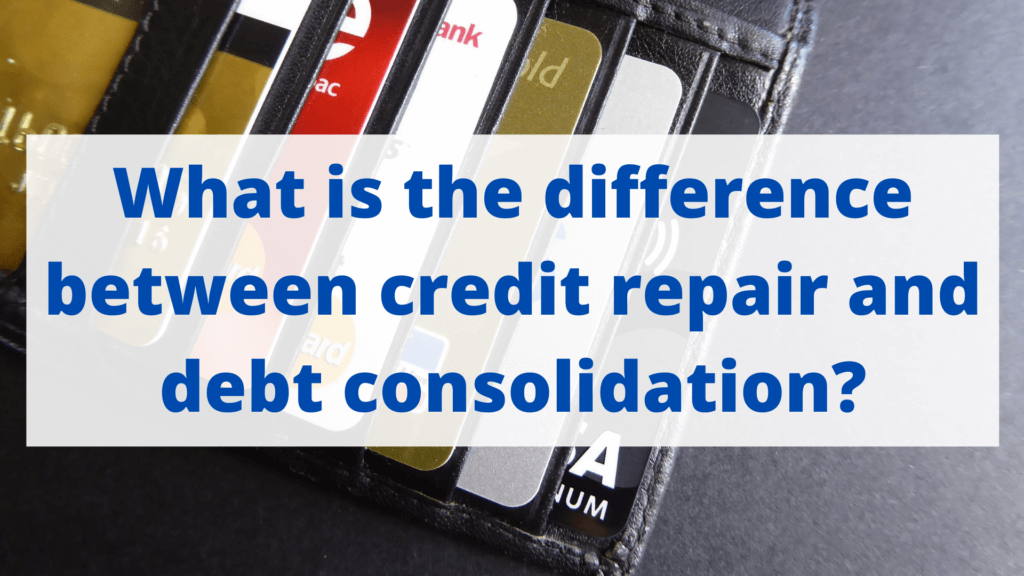What is the Difference Between Credit Repair and Debt Consolidation?
Student loans, unpaid credit, car loans, and mortgages can make it hard for you to enjoy some finer things in life. You may not travel as much as you would and starting a family can seem like a burden. To get out of these debts, you may be considering credit repair services or debt consolidation. But what is the difference between credit repair and debt consolidation?
Difference Between Credit Repair and Debt Consolidation
Credit repair and debt consolidation both help you improve your credit score, albeit through different processes. Here are the differences between the two;
Debt Consolidation
If you have several debts, you may forget to pay off some of the loans hurting your credit score. Debt consolidation enables you to have only one debt instead of having several. It involves taking a new loan to pay off multiple smaller loans in one go. You may need to take out a personal loan or use home equity loans to pay off the other debts.
Whether you choose a personal or home equity loan, you will have to compare interest rates from different lenders to see which one has the best deal. And when you receive the loan, you will pay off all your debts and start paying the new loan.
- One monthly payment. With all your debts consolidated, you only have one monthly payment and one set of interest rates instead of several payments and interest rates with different creditors.
- Lower interest rate. If you find yourself with a lot of high-interest credit cards or other types of debt that charge exorbitant rates, consolidating it into one loan can help reduce your overall interest rate because it’s easier for lenders to give out loans at lower rates than individual ones. This can save you money in the long run if your original loans had high annual percentage rates (APRs).
- Improves credit score. When you apply for debt consolidation, there will be a hard inquiry on your credit report, which means your credit score will dip. However, your credit score will start improving as you pay off revolving lines of credits, e.g. credit cards and when you make on-time payments,
- Streamlines payments. Consolidating your debt into one eliminates your chances of missing a payment. You will only have one payment to make a month, and you will know when you will finish paying off your loan to start a debt-free lifestyle.
Disadvantages of Debt Consolidation
- You may have to pay more interest. If your credit score isn’t high enough, you may qualify for a loan with high interest. The interest rate charged on debt consolidation loans is usually higher than that charged on other kinds of loans, such as home equity loans or second mortgages. This means that you will end up paying more interest charges in the long run.
- There will be a hard inquiry. Hard inquiries will have a negative impact on your score.
- You may lose your assets. If you decide to take out a personal loan for debt consolidation, it is possible that your creditor may ask for collateral from you. In case you fail to repay the loan or make late payments, your creditor may sell off your assets as payment for the loan. This could mean losing your home or other valuable possession that can be sold off easily at market prices.
- It can create more stress than it relieves. It’s easy to get addicted to debt relief programs because they make us feel better temporarily and make us think we have solved our financial problems when in reality we haven’t really done anything about them yet – we’re just putting them off for another day!
- May be costly. When you apply for a debt consolidation loan, ensure you know of the added costs before you accept to sign the agreement. Debt consolidation comes with additional costs such as balance transfer fees, annual fees, and annual fees. Thus, the need to understand the terms and conditions when looking for a lender.
- Closed accounts may hurt your score. The age of your credit account makes up 15% of your credit score, and closing old accounts will lower the average age of your account.
Credit repair
Credit repair is a service that helps you to improve your credit score and repair credit reports. Credit repair companies will typically help you remove inaccurate information from your credit report, dispute incorrect information with creditors or the credit bureaus, and help you to obtain copies of your credit reports for free.

Advantages of Credit Repair
- Help save money. Helps you save money by increasing your chances of getting approved for loans with lower interest rates.
- Reduces interest. Credit repair companies help you get out of debt by removing late payments from your report, which reduces the amount of interest that creditors charge on outstanding debts.
- Reducing your debt-to-income (DTI) ratio. If you have a high DTI ratio, it can make it difficult for you to qualify for new loans or other types of credit. Reducing your debt load can help lower your DTI ratio and make it easier to obtain new loans.
- Remove inaccurate or old information. Removes old, unnecessary and inaccurate information from your credit reports that are keeping you from getting approved for loans, credit cards or other services you need
- Improving your chances of qualifying for new loans or other types of credit. If you have unpaid debts, creditors may not grant you additional loans until those debts are addressed through a settlement or repayment plan.
- Maintaining or improving your credit score. When you pay off debts, the negative information associated with them will no longer appear on your credit reports, and your score will improve.
Disadvantages of credit repair
- Credit repair is not free. While there are companies that will offer to help you repair your credit for free, they aren’t likely to be reputable ones. You’ll end up paying a hefty fee after their work is done — and you may still have errors on your report that need to be fixed.
- Credit repair takes time. There’s no magic bullet for fixing your credit score and history, so be prepared for this process to take several months (and maybe even years) if you have extensive problems with your credit report. If you’re concerned about being able to pay bills while this is going on, consider opening a savings account specifically for the purpose of paying off debts during the time it takes to complete your repairs.
- You might not see results immediately. When you’re working with a reputable company like The Ascent network that specializes in credit repair, they’ll typically start working on your behalf as soon as they receive all of the information they need from you and any supporting documentation they require (such as copies of past bills).
Our Bottom Line
When choosing between credit repair and debt consolidation services, ensure you know all the pros and cons associated with each so that you can choose the one that will work for you.
A more positive outlook toward a more financially secure future starts today. Give the Ascent Network a call today at 1-877-871-2400. Ascent Network helps consumers all over the United States and is available locally in Huntington Beach, CA, Coachella Valley, Palm Springs, Cathedral City, Rancho Mirage, Palm Desert, Desert Hot Springs, Indian Wells, La Quinta, Indio, and Thousand Palms.


